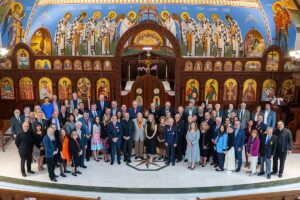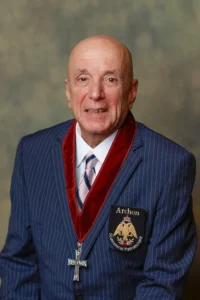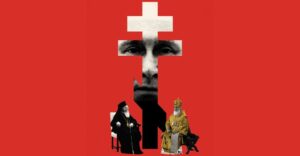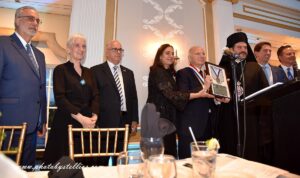On March 30, 2019, the Archons of the Metropolis of Atlanta held a Religious Freedom banquet in Atlanta, GA, organized by Regional Commander Dr. Manuel Tissura. Fr. Paul Costopoulos of Birmingham, Alabama was the guest speaker and presented a paper on ‘The Critical Issue of Autocephaly’ regarding the Ukrainian Orthodox Church’s recent independence, granted by the Ecumenical Patriarchate. The paper is presented below.
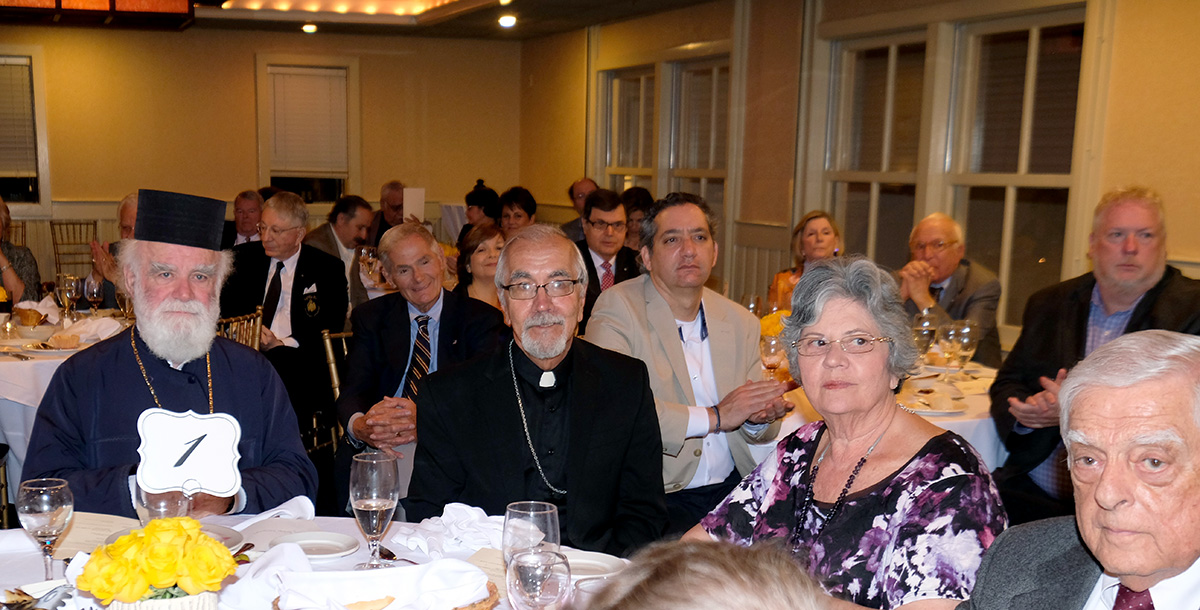
The Critical Issue of Autocephaly
by Father Paul Costopoulos
“Have no anxiety about anything, but in everything by prayer and supplication with thanksgiving let your requests be made known to God. And the peace of God, which passes all understanding, will keep your hearts and your minds in Christ Jesus.…”
These words come to us from Paul’s Epistle the Philippian Christians 4:6-7. Liturgically they are read in the Orthodox Church on Palm Sunday. They speak to us about the antidote to anxiety about anything including this evening’s topic “The Critical Issue of Autocephaly in the Ukraine.” The antidote is three fold: prayer, supplication and thanksgiving.
Before delving into this evening’s topic, allow me to first thank His Eminence Metropolitan Alexios and Manuel Tissura, It is through their gracious invitation that I am here this evening, as your keynote speaker. It is a privilege being here to address this august body of Archons of the Ecumenical Patriarchate, their spouses and guests. I pray my comments will be both informational and well received.
The word autocephaly comes from the Greek word autokefaleia which means “self-governance”. In 2016 when the Ukrainian Parliament asked the Ecumenical Patriarch of Constantinople to grant autocephaly to the Ukrainian Orthodox Church, the majority of the Ukrainian Orthodox Christians supported them. In April, 2018 the Parliament’s proposal was repeated by Ukrainian President Petro Poroshenko who sent a petition directly to Patriarch Bartholomew in Constantinople. This was one of several attempts by the Ukrainian Orthodox Church to become independent from the Russian Orthodox Church during the past century. On this occasion they were successful, as noted by the following sequence of events.
On October 11, 2018 the Ecumenical Patriarch decided to create a local ecclesiastical structure in Kiev that would be directly accountable to the Ecumenical Patriarch. This decision would be a revocation of the Synodal Letter of 1686 issued by the then Ecumenical Patriarch Dionysios IV granting the right through oikonomia to the Patriarch of Moscow to ordain the Metropolitan of Kiev, the head of the Ukrainian Orthodox Church, with the understanding that the Ukrainian Orthodox Church liturgically would commemorate the Ecumenical Patriarch. The Holy Synod of our Holy Archdiocese on October 12, 2018. issued an encyclical in support of this decision.
On November 19, 2018 the Ecumenical Patriarch issued another statement confirming that the UOC would be granted independence.
On December 15, 2018 at a Unification Council in Kiev, a new Primate in the person of Epiphanius, Serhi Dunenko, was elected. His title would be that of Metropolitan and not Patriarch, though such a title could be conferred upon him at a later time. Metropolitan Epiphanius is only 40 years old.
On January 6 of this year, Patriarch Bartholomew handed over the Church decree (tomos) of Autocephaly to Epiphanius in Constantinople, whose enthronement as the head of the Ukrainian Orthodox followed in early February.
Russia’s response was both quick and reactionary. The reaction came from a two-fold source: (1. from the government in the persons of Vladimir Putin and others; and (2. from the Patriarch of Moscow in the person of Patriarch Kiril. Both protested as early as October, 2018.
Putin protested publicly. Though “high profile” in nature, his protest was innocuous since he and others believe in the separation of church and state.
Metropolitan Kiril’s protest was less innocuous. On October 15, 2018 he broke off Communion with the Patriarchate of Constantinople and his supporters. The Orthodox Church of the Czech lands and Slovakia, and the Church of Poland–which are both independent but have traditionally been under Moscow’s influence—were quick to express their solidarity with the Russian Patriarch. . In addition, at a meeting in early November, 2018, the Serbian Orthodox Church refused to acknowledge the decision of the Ecumenical Patriarch.
Lest we think the present issue is strictly a political and hierarchical one that has no bearing upon our local parishes here in America, I would ask you to consider the following.
Impact of Issue Upon Local Church
My brother in Christ, Fr. Kevin Milsaps of the Huntsville Community was recently in need of a priest to cover for him on several Sundays in March because of an injury that he incurred when he accidently slipped on concrete. Since I had formally retired from the Parish ministry on March 1 of this year, I agreed to serve Liturgy for him in Huntsville on both Cheese Fare Sunday also called Forgiveness Sunday, and on the Sunday of Orthodoxy, which commemorates the Triumph of Orthodoxy and the restoration of the icons to the churches by the Empress Theodora and her son Emperor Michael III
In many Communities, it is customary to celebrate a Pan-Orthodox Vespers on the Sunday of Orthodoxy. An Orthodox Church in a particular city or town is identified for the Vespers, and the clergy and laity of the various Orthodox communities attend and participate. This year, in Huntsville the Greek Orthodox Community of Holy Cross—SS. Constantine and Helen hosted the Vespers, and the laity of one other Orthodox Community in Huntsville, St. Michael Serbian Orthodox Church, together with their dedicated and personable priest attended.
There were 50 members of St. Michael Church present with their priest. I was excited to welcome them, but saddened by a conversation that I had with their priest in the altar prior to the commencement of Vespers. After greeting one another, he lovingly and jokingly asked me, “What’s the deal with the Ecumenical Patriarch? Why is he doing what he is doing? He is making it difficult for us Orthodox to remain in Communion with one another. You should know that I had to get permission from my own Bishop to come here this evening.”
The particulars of the conversation that ensued between the Serbian Orthodox priest and me are irrelevant. What is relevant though is the answer to the question. “If Orthodox Christians of different jurisdictions in Huntsville, AL cannot worship with one another and receive Christ into their lives through Holy Communion from the same Eucharistic Chalice with one another, wherein is Orthodoxy’s Triumph that is commemorated on the Sunday of Orthodoxy?
The reaction by the Patriarch of Moscow to the granting of autocephaly to the Ukrainian Orthodox Church is a critical one. Through his decision to break off Communion with Constantinople, our One, Holy, Catholic and Apostolic Church which for 2,000 years has been united, is now divided. To be sure, the Faith of the Church is Triumphal. But, the institutional nature of the Church is not. The issue that our Patriarchate has with Patriarch of Moscow is not only who has the right to grant autocephaly to a national church. But it also has to do with unity. Unity of all Christian believers is something for which Jesus prayed prior to His ignominious betrayal (John 17).
The Ukrainian Church
The National Commander of the Archons, Anthony Limberakis, several months ago issued a wonderful memorandum to the Clergy and Laity regarding Unity in the Ukraine. For those who are interested in learning more about the current state of the Ukrainian Orthodox Church, you would do well to read it. It is not my intent to recapitulate all that he says. But there are several things all would do well to know to understand why the Patriarchate granted autocephaly to the Ukrainian Church.
There are in the Ukraine 18,500,000 Orthodox Christians. Just as there are a number of Orthodox jurisdictions in the United States, so also in the Ukraine there are/were three jurisdictions: the Kievan Patriarchate (11 million), the Ukrainian Orthodox Church of the Moscow Patriarchate (6 ½ million), and the Ukrainian Autocephalous Orthodox Church (750,000). The tomos of autocephaly granted by Ecumenical Patriarch Bartholomew unites all three jurisdictions, though the churches of the Ukrainian Orthodox Church/Moscow Patriarchate have been given the choice of remaining under Moscow should they so choose.
Since the tomos of 1686, granting the Patriarch of Moscow the rite to ordain the Metropolitan of Kiev, a number of geo-political situations within the Ukraine precipitated the Ukrainian Orthodox Church’s request for autocephality. These situations came to a head in the 20th and 21st century.
There are three events in particular I wish to recall: (1. the extermination of millions of Ukrainians by the ruthlessness of the Stalin regime [Stalin was General Secretary of the Communist Party of the Soviet Union from 1922-1953, and Premier, 1941-195—like Lenin before him, he believed that Christianity was the opiate of the people]; (2. the odious Nazi occupation of the Ukraine during WWII and the subsequent fight between the Russians and Germans to integrate the Ukraine in their Empires; and (3. the annexation by Russia of the Crimea in 2014, and the death of over 10,000 Ukrainians in the separatist uprising of the pro-Moscow eastern Ukraine the very same year. The latter event was the straw that broke the camel’s back.
The Ukraine’s political leaders such as Petro Porochenko and many Ukrainian church people pushed for a Ukrainian Church to be fully free of Russian oversight. Such a break would mean little in terms of the everyday life of the faithful. But it would effectuate another significant break from Russia and its involvement with Ukrainian affairs. Furthermore, as is favored by millions of Ukrainians, it would lead to the further “Ukrainiazation” of the Ukrainian Orthodox Church. To quote a Ukrainian lawmaker as quoted in a recent edition of the Washington Post, “Excuse my pathos, but this is really about Russia’s control over the minds and souls of the Ukrainian people.”
Russia’s Response
In addition to breaking off Communion with the Patriarchate of Constantinople, the Patriarch of Moscow and his cohorts aggressively and vociferously criticized Patriarch Bartholomew. According to the Associated Press the Russians had even engaged in a cyberattack against the Patriarchate’s email accounts to impede the process of autocephaly.
The real issue, the Patriarch of Moscow says, is the tomos of 1686, though most observers say the real issue is not the tomos, but the on-going and age-old struggle between Moscow and Constantinople for primacy among the 250 million Orthodox people in the world. Patriarch Kiril and Vladimir Putin believe that the Patriarch of Moscow should have primacy because it has more adherents, more money, more seminaries, monasteries and theological schools than any of the other Patriarchates.
At this point I must emphasize that what I have to say is tempered by my “Greek” prejudices and my loyalty to and support of the Ecumenical Patriarchate. I know that if a Russian Orthodox Bishop, priest or lay person were to be giving this presentation, completely different perspective in support of the Patriarch of Moscow would be given. Our differences would be as pronounced as the politically partisan disagreements between Democrats and Republicans in our nation today. Nevertheless, I am firmly convinced that a number of inscrutable reasons do exist as to why the acrimonious response of Moscow toward Constantinople is alarming.
The first reason is historical and the fact that Constantinople is the mother of Russian Orthodoxy. Who was it, for example, who brought Christianity to the Slavs and even gave them an alphabet in which to read and write and translate Scriptures and the liturgical books of the Church into their language? Was it not Cyril and Methodius, two Greek brothers of Thessalonica who at the behest of the Patriarch of Constantinople, St. Photios, took the Gospel to the Slavs that led to the eventual Christianization of Russia?
And historically was it not Constantinople that was responsible for the Evangelization of the Ukrainians that prompted Prince Vladimir to appeal to Constantinople for help to evangelize his people after his emissaries, who attended a Liturgy at Agia Sophia, returned and reported to him “We knew not whether we were in heaven or on earth, for surely there is no such splendor or beauty anywhere on earth. We cannot describe it to you: only this we know, that God dwells, there among humans, and that their worship surpasses the worship of all other places.”
The 2nd reason why Moscow’s response is alarming is canonical. The Russians, I know, give much lip service to liturgical propriety, external beauty, and canonical decorum, as indeed all should. What befuddles me, however, is why the Patriarchate of Moscow disregards the canons of the Ecumenical Councils that accord Constantinople the right to grant autocephaly to churches.
Consider if you will three of these canons.
In the third canon of the 2nd Ecumenical Council it was ruled: “The Bishop of Constantinople shall have seniority of honor after the Bishop of Rome.”
Canon 28 of the Fourth Ecumenical Council ruled, “Following in every detail all the decrees of the Holy Fathers, we ourselves have decreed and voted the same things about the seniority of the most holy throne of the same Constantinople, the New Rome…”
And the 6th Ecumenical Synod decreed in Canon 36, “Renewing the enactments by the 150 Fathers assembled and those of 630 who met in Chalcedon, we decree that the See of Constantinople shall have equal authority with the See of Old Rome… After Constantinople shall be ranked Alexandria, then Antioch, then Jerusalem.” Nowhere is Moscow mentioned for the Moscow Patriarchate at the time did not exist.
A third reason Moscow’s response is alarming because it is divisive and inspired by pride. Russia may have more resources and followers than any of the other Patriarchates, but (and this is my judgmental opinion) it has less humility. The Patriarch of Moscow must revisit his position, humbly acknowledge Patriarch Bartholomew’s prerogatives, and withdraw his directive of excommunication. His failure to do so could lead to a permanent schism of our Holy Orthodox Church.
Parenthetically let me state that publicly the Russians object to Constantinople on grounds of jurisdiction. Questions of autocephaly, they say, should be decided by Orthodox Christianity’s independent churches at a Great Council—and not unilaterally by Patriarch Bartholomew. But the question can be asked. Where were the Patriarch of Moscow and his supporters when the Great Council was convoked in Crete by Patriarch Bartholomew 2 years ago?
Conclusion
I wish to conclude as I had begun by quoting the Apostle Paul’s words to the Philippian Christians: “Have no anxiety about anything, but in everything by prayer and supplication with thanksgiving let your requests be made known to God. And the peace of God, which passes all understanding, will keep your hearts and your minds in Christ Jesus.…”
As Archons of the Ecumenical Patriarchate whose task it is to defend the integrity and freedom of the Patriarchate, your task relative to the issue of the Autocephaly of the Ukrainian Orthodox Church is a simple one. In addition to being informed, you must pray and call upon the name of the Lord that the present crisis will be resolved. And never fail to give thanks to God for Patriarch Bartholomew, successor to St. Andrew, who like other Patriarchs of Constantinople has tirelessly worked to uphold the Faith of Christ and maintain the unity of our Holy Orthodox Church. By so doing we pray that by God’s grace, unity will be restored and that once again we will be able to say as does the Psalmist, in Psalm 132/133, that is read liturgically by our Church at every Liturgy of the Pre-sanctified Gifts.
“Behold how good and pleasant it is for brothers to dwell in unity. It is as ointment upon the head, which runs down over the beard, the beard of Aaron, runs down to the hem of his garment. It is like the dew of Hermon which falls on the mountains of Zion, for the Lord has ordained the blessing: life forever more.”
Fr. Paul Costopoulos
March 30, 2019
Atlanta, GA

